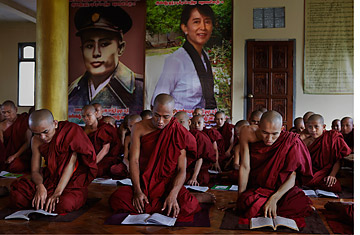
Posters of Suu Kyi and her father, independence hero Aung San, hang behind monks at a monastery outside Rangoon.
(3 of 3)
For most Burmese, though, the sanctions debate is a distant exercise. In the country's borderlands, ethnic minorities backed by ragged militias document the Burmese military's institutionalized rape, torture and looting that have alienated people already suspicious of a leadership dominated by the country's majority Bamar ethnicity. Fighting has flared most fiercely in northern Kachin State, on the border with China. I try calling a Kachin rebel fighter I know, but his family tells me he is somewhere on the jungle front line. The government says it is pushing for a cease-fire. But getting all of Burma's 135 or so ethnic groups, who make up some 40% of the nation's population, to submit to a central authority after decades of abuse may be far more difficult than a dtente between the Lady and the generals.
Even in Rangoon, simple survival fills many people's days. In the dusty outskirts of the city, at the nation's only private AIDS clinic, I meet Khin Than Nwe, a 30-year-old dying of a disease that is quietly stalking an ignorant populace. Burmese spending on health and education is among the lowest in the world, and the government has tried to shut this clinic down before, lest it expose Burma's failings to the world. Khin Than Nwe bore three children, but each died within a few months. She thought it was malnutrition, a constant in a country where one-third of people live below the poverty line. It was only after she was diagnosed last year with AIDS, a disease she had never heard of despite living in a village just 55 km from Rangoon, that she figured out what had really killed her babies. As a clinic assistant brushes flies off her, I ask Khin Than Nwe if she knows the two people pictured on the caregiver's keychain. "That's our Lady," she answers, bringing her hands together in benediction. But she doesn't recognize the man standing next to Suu Kyi. It is President Thein Sein, who was photographed with her during their historic meeting this summer.
Burma's current constitution doesn't allow Suu Kyi to serve as President because of a bizarre rule that bars anyone ever married to a foreigner from leading the land. (Suu Kyi, who spent much of her early life living abroad after the assassination of her independence-hero father Aung San, was married to a British scholar who died while she was under house arrest.) Not everyone supports the NLD's re-entry into politics. Badanda Pamoutka, the abbot of a monastery that participated in the 2007 protests, is mystified by the opposition's course. Some monks who led the peaceful demonstrations four years ago are still in jail. "I don't understand why the NLD wants to cooperate with this regime," the abbot says. Others are convinced the current glints of openness are a ruse by strategic generals backed by former junta chief Than Shwe. "If they want, the authorities can still throw me into jail for whatever reason they want," says Zayar Thaw, a hip-hop artist who didn't consider himself political until the authorities banned his music and then imprisoned him for four years. "How can you say this is a democratic government?"
All that is true. But if Suu Kyi succeeds in her quest to join parliament — by which I mean the government does not rig the vote against her — then she may have a space to use her considerable charismatic skills. Surely there are parliamentarians associated with the regime who want development for their homeland too. The Lady could be a kingmaker in the 2015 elections. "I'm no hero worshipper, but I know she's indispensable," says Win Htein, an NLD stalwart who emerged from 14 years in jail in 2010. "Even if she is not the government leader, in the people's hearts, she is already our national leader." As he speaks, the lights in the NLD's dilapidated Rangoon headquarters flicker, then die, the curse of a resource-rich country with scant public services. Burmese often find themselves in the dark. But at least now a glimmer of hope burns anew.
